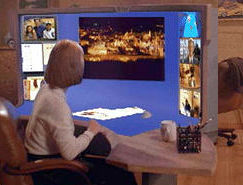|
Looking out the windows
(1965) "Same old places and the same old songs...
It's the singer, not the song." - Jagger/Richards
(1929) "You may forget the singer, but don't forget this song." - A.P. Carter
It's the singer, not the song." - Jagger/Richards
(1929) "You may forget the singer, but don't forget this song." - A.P. Carter
- Should I buy now or wait for faster/better/cheaper?
- Should I upgrade to VISTA and/or Office 2007?
- Should I switch from Windows to Apple or Linux?
- What should I do with the old hardware?
| Machine CPU Clock Memory |
O/S | Seconds to GUI | Browser | Seconds to Browser |
|---|---|---|---|---|
| 1991 Dell "JAWS" 486DX 50 MHz 32MB |
Windows 3.11 | ∞? (80) | Mosaic 2 Netscape 3 Netscape 4 |
90 100 110 |
| Dell SVR4 2.2 | 110 | (none) | ||
| Windows 95 | 70 | IE 5.5 | 125 | |
| Windows NT4 | 130 | IE 6 Netscape 4 Firefox 2 |
160 165 255 |
|
| Red Hat 5.2 | 145 | Netscape 4 | 250 | |
| 1998 Dell Optiplex GXa Pentium 266 MHz 192MB |
Fedora 1 | 195 | Firefox 1.5 | 230 |
| 1999 Dell Optiplex GX1 Pentium II 450 MHz 384MB |
Windows 98 | 55 | IE 6 | 60 |
| Windows NT4 | 75 | IE 6 | 80 | |
| ubuntu 6 | 145 | Firefox 1.5 | 160 | |
| 1999 Dell Optiplex GX1 Pentium II 450 MHz 512MB |
Windows 2000 | 170 | IE 6 | 225 |
| Red Hat 9 | 210 | Firefox 1.4 | 230 | |
| Windows XP SP2 | 150 | IE 7 Firefox 2 |
165 205 |
|
| Fedora 6 | 300 | Firefox 1.5 | 320 | |
| 2004 Apple iBook PPC G3 900 MHz 640MB |
OS X 10.4 | 60 | Safari Firefox 2 |
70 105 |
| 2004 Apple eMac PPC G4 1517 MHz 512MB |
OS X 10.4 | 40 | Safari | 45 |
| 2004 Sony Vaio Pentium 4 2800 MHz 1536MB |
Windows XP SP2 | 65 |
IE 7
Firefox 2 |
100 200 |
| 2005 Dell Latitude D510 Pentium M 1733 MHz 512MB |
Windows XP SP2 | 60 |
IE 7
Firefox 2 |
120 185 |
| Fedora 6 | 90 | Firefox 1.5 | 110 | |
| 2006 Apple MacBook Core Duo 2000 MHz 2048MB |
OS X 10.4 | 30 | Safari Firefox 2 |
35 50 |
(Some disclaimers before a few semi-random observations. There was minimal effort to be even-handed in the comparisons and to try to make the timings reproducible. The two timings listed tend to bring out the worst in most platforms -- once a platform is up and running, it is often much faster to close/re-open a browser, for example. Some of the hardware was disadvantaged by what might seem like unusual peripherals and/or multi-boot configurations. My natural tendency is to advocate Unix derivative systems, i.e., to give preference to Linux and OS X. I use and probably will continue to use Windows XP as my preferred GUI. I own shares of MSFT.)
- A 486 with "age appropriate" software seems more competitive than expected.
- The software bloat phenomenon may be even stronger in Linux than Windows.
- The "bloat" seems most noticeable on obsolescent (1999) hardware with today's software (Fedora, ubuntu, Windows XP).
- Linux seemed to bog down between Red Hat 5.2 and Fedora 1, a.k.a. "Red Hat 10".
- Windows seemed to bog down between NT4 and "NT5", a.k.a. Windows 2000.
- Though browsers are harder to characterize, installation times (not shown) seemed dramatically longer with Netscape 4 vs. Netscape 3 and with IE 6 vs. IE 5.
- OS X seems the outright winner, the platform of choice, based on these benchmarks.
coda
|

